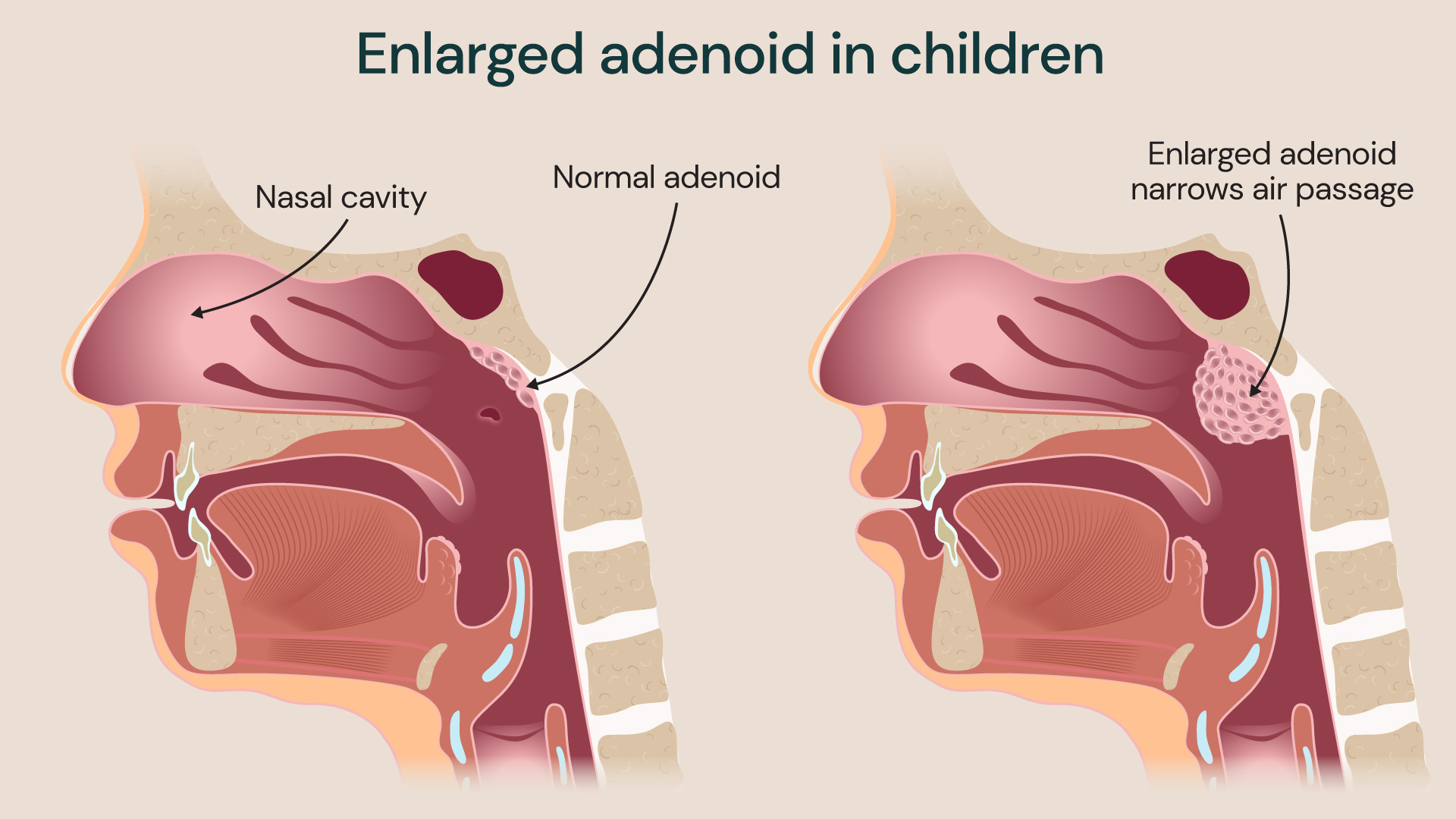An adenoidectomy is a surgical procedure to remove enlarged adenoids.
As part of our specialist paediatric ear, nose and throat service, our surgeons perform adenoidectomies for children experiencing health problems because of enlarged adenoids.
We understand it can be worrying when your child undergoes surgery, but you can rest assured that our expert ENT team has the knowledge and experience to give your child the best possible care.
What are enlarged adenoids?
Adenoids are small pieces of tissue in the back of the nose and throat, just above the tonsils. Although you can see your child’s tonsils, you cannot see their adenoids because of their position. Adenoids are part of the immune system and play a role in protecting the body from infections. They can swell when unwell.
From around the age of 5 to 7, your child’s adenoids start to shrink and their role in fighting infections reduce as your child gets older. However, their adenoids can sometimes remain enlarged. This is rare in adults but much more common in children.
The treatment that cures large adenoids is an adenoidectomy.
What are the signs of enlarged adenoids?
If your child has enlarged adenoids, they may experience:
- a runny/stuffy nose
- problems sleeping, snoring and sleep apnoea
- ongoing cough
- difficulties swallowing
- swollen neck glands
- a blocked feeling in your ears
- recurrent ear infections
- bad breath
- heavy mouth breathing
What is an adenoidectomy?
Adenoids are a patch of tissue containing immune cells at the back of the nasal passage. Like tonsils, they help fight infections caused by harmful bacteria and viruses.
When your child has an infection affecting the ears, nose or throat, adenoids can become inflamed and enlarged. This can feel sore and make breathing difficult.

Adenoids can become inflamed and enlarged in response to infection, narrowing the airways.
An adenoidectomy is the surgical removal of the adenoids. This may be recommended for your child if their adenoids often become infected and enlarged, and they don’t respond to conservative measures and possibly treatment such as antibiotics.
Research studies show that removing the adenoid does not increase the risk of getting colds or infections.
Adenoidectomies are one of the most common operations performed on children, and our specialist team at Evelina London Children’s Hospital are experts at it.
We ensure your child is comfortable and cared for during and after their adenoidectomy, so you can be confident you’ve made the right decision when choosing private care with us.
How does an adenoidectomy work?
Before your child undergoes an adenoidectomy, one of our ear, nose and throat (ENT) consultants may look inside their nose with a light or a small, thin tube with a camera attached. The reason is to check for any blockages before removing the adenoids. This will depend on the age of your child.
We perform adenoidectomies under general anaesthetic, meaning your child will be asleep during the procedure. Once the anaesthetic has taken effect, the surgeon will remove their adenoids through the mouth. The surgery is either done by carefully cutting them out or using special tools that apply heat or radio frequency energy to remove them.
The process of an adenoidectomy is the same regardless of whether you are an adult or a child. The whole procedure takes around 30 minutes to complete.
Sometimes, surgeons can perform a tonsillectomy (tonsil removal) or grommet surgery (ear draining) simultaneously as an adenoidectomy if they are also causing problems.
How to prepare for an adenoidectomy
Before an adenoidectomy, your child must avoid food and drink for a set time as the procedure requires an empty stomach. We perform adenoidectomies as a day case, meaning your child can go home on the same day.
Recovery and aftercare
Immediately after an adenoidectomy, we’ll take your child to the recovery room and provide medicine to relieve pain and swelling.
It’s normal after the operation for your child to:
- feel nauseous
- have a blocked nose
- have a sore throat
- temporarily have a nasally-sounding voice
- have bad breath
It takes around one week to recover from an adenoidectomy fully, although they may feel blocked in the nose for a little while longer.
When your child is recovering, it’s best to:
- keep them off school for the week to rest
- stop them from being around many people to reduce the infection risk
- alternate paracetamol and ibuprofen to reduce pain and swelling
- help them keep eating and drink plenty of fluids
Always follow the surgeon’s aftercare advice to ensure your child can recover well.
Why might someone need an adenoidectomy?
An adenoidectomy can be a necessary treatment if your child’s adenoids are enlarged and causing other persistent symptoms. Frequent ear infections, including glue ear (a middle ear infection), difficulty breathing and sleep apnoea, are all symptoms that cause pain or block the airways.
The best way to treat these symptoms is with an adenoidectomy.
Adenoidectomies are generally carried out for children. Surgeons can perform adenoidectomies on adults experiencing these problems, but it is uncommon as your adenoids will have usually disappeared by early adulthood.
Risks of an adenoidectomy
Although an adenoidectomy is a simple procedure, as with all surgeries there are some risks associated with it. Rare complications can include:
- bleeding that needs a second surgery to stop it
- tooth damage (knocks or chips can occur)
- infection
- difficulty breathing due to swelling in the throat
- nasal regurgitation
- adenoids growing back needing further surgery
Complications are uncommon in adenoidectomies. However, if your child experiences the below, seek urgent medical care:
- pain that is getting worse or doesn’t subside with pain relief medication
- a fever or high temperature
- a stiff or painful neck
- inability to drink fluids
Book an appointment with us
At Guy’s and St Thomas’ Specialist Care, we prioritise your children’s health and wellbeing throughout their time with us. We provide high-quality care and have created a child-friendly environment to help them relax while undergoing ear, nose and throat treatment.
Evelina London Children’s hospital is home to paediatric consultant ear, nose and throat surgeons, audiology consultants, speech therapists and specialist nurses who work together to provide comprehensive care for your child.
Book a consultation with our consultants today. Our supportive team is here to guide you through the process of an adenoidectomy from start to finish.
Locations
Our paediatric specialists perform adenoidectomy for children at the following locations:
Discover our children's ear, nose and throat experts
Evelina London Children’s hospital is home to world-leading paediatric consultant ear, nose and throat surgeons, audiology consultants, speech therapists and specialist nurses who work together to provide comprehensive care for your child.
